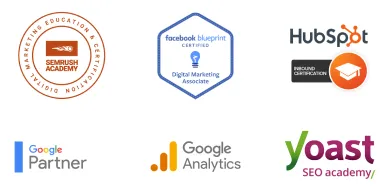TO LEARN IS TO GROW
Learning Center
We do our research and publish our results. Should probably call this the Growing Center.


The Benefits of Hiring a Pay-Per-Click Management Agency
Working with a pay-per-click management agency allows you to reach a highly targeted audience, resulting in increased sales and improved brand awareness and online visibility.
While it is okay to bootstrap some aspects of your marketing, hiring a pay-per-click management agency might be a more cost-effective way for solo entrepreneurs and small businesses. This is particularly true if you have no budget or resources to have an in-house paid ad marketing team.
Before we delve into the benefits of hiring a digital marketing agency to do your pay-per-click campaign or PPC, let’s first discuss this internet-based advertising model.
In a nutshell, PPC is an advertising model in which the advertisers only pay when consumers interact with their ad through clicks and impressions. This is the complete opposite of search engine optimization or SEO, in which the traffic is “organic,” meaning the businesses do not pay for it.
What Makes Pay-Per-Click Marketing Tricky?
In the early days of PPC, it was almost a surefire way for small- and medium-sized businesses to compete with bigger companies. But nowadays, this advertising model requires a more creative approach with keyword choice if you want to remain competitive amidst this crowded market.
Another challenge is the rising cost per click or CPC. But if done properly, meaning the ads are only shown to high-quality leads or consumers who are most likely to make a purchase, this advertising model is an excellent investment because it can bring in more traffic (and sales) that is more than the click’s worth.
The Benefits of Hiring a Pay-Per-Click Management Agency
You can avoid costly mistakes
To create a cost-effective or even “affordable” PPC campaign, make sure that you use high-quality keywords and phrases and that the paid ad is only shown to people who have already searched for these keywords.
This advertising model has a steep learning curve for a layperson, and any mistakes are costly in the most literal sense. Remember, bidding on non-converting keywords represents money that goes down the drain.
PPC specialists can measure the success of your paid ads by looking at metrics such as conversion and click-through rates. They can also reduce your “wasted spend,” which is the money that goes to clicks that don’t convert into sales (or any desired result).
To reduce wasted spend, Rocklin-based PPC specialist LOJO Marketing suggests using negative keywords, which filter out traffic that is irrelevant to your business or product, meaning it is unlikely to get converted.
With negative keywords, you prevent your ads from being displayed to search queries that contain these keywords.
PPC specialists can identify the weakness in your ad campaign
Seasoned PPC specialists can identify any weakness in your campaigns and tweak them to make sure that they give you the desired results. For instance, if the ads are not generating enough clicks or calls to action even after raising the bids for high-quality keywords, they might test the campaigns to identify any “gaps.”
The target audience is incorrect.
The ad text or content is poorly written.
The landing page is poorly written or it does not fulfill the “promises” of the ads.
A combination of these “gaps.”
PPC specialists ensure that your campaign is “mobile-friendly”
Around 63% of paid Google search clicks in the US came from mobile devices, according to a 2018 survey released by Statistica. The trend is expected to increase in the coming years, prompting PPC experts to rethink their ads for mobile users.
On the surface, PPC looks like an easy advertising model. However, laypersons don’t have the skills to test the mobile ads or create paid ads targeting mobile users.
Paid ads experts can measure your success
Unlike traditional media such as TV and radio, in which it is hard, if not impossible, to measure the success of ad campaigns, internet-based advertising models like PPCs have metrics that allow marketers to measure the effectiveness of their campaigns.
The PPC metrics are technical jargons that may be hard for a layperson to understand, much less to utilize them.
The list below explains the PPC metrics that determine success or lack thereof.
Quality score. It pertains to the relevance of keywords and phrases and takes into account these following factors: keyword relevance to the ad group and search query; quality of the landing page; the click-through rate or CTR of the keyword and its corresponding ad; and the CTR of the URLs in the ad group.
CTR. Most seasoned PPC specialists view CTR as the most important metric because it tells them if the ads are relevant to the search users and it determines the quality scores.
Conversion rate. In a nutshell, it shows how many users click the ads and proceed to complete the desired action on the landing page. If your paid ad has a strong conversion rate, it means that the budget per click is converting into profits.
Cost per conversion. This metric allows you to decide if your PPC campaign is an investment that provides excellent ROIs.
PPC specialists provide a more specialized experience
Failure to differentiate search, social, and display is a costly PPC mistake. To make sure that your paid ads convert into sales or any other desirable results, you have to “respect” the buyer’s journey, demographics, and online activities.
Search. People who conduct searches might be familiar with your brand but want more information about the product or service.
Display. Unlike the search group, display audience may not be even familiar with the brand or desire to make a purchase.
Social. This audience might not be familiar with your product but may convert into an actual consumer if the advertiser provides them with a unique experience or the “sales pitch” speaks their language.
Final Word About The Benefits of Hiring a Pay-Per-Click Management Agency
To learn more about how PPC can drive your sales and boost brand awareness and online visibility, contact LOJO marketing at (916) 303-4080.
Built for Growth. Backed by 25 Years of Trust.
For over two decades, LOJO has been a trusted partner to hundreds of businesses just like yours. Whether working directly with owners, managers, teams, or boards of directors, our goal remains the same: to be a reliable and results-driven asset to your business.
Over the years, we’ve carefully built a team of experts—each selected for their unique skills, strengths, and personalities. Our clients choose LOJO because they know we genuinely care about their success.
And after 25 years of helping businesses grow, we’re more committed than ever.



Built for Growth. Backed by 25 Years of Trust.
For over two decades, LOJO has been a trusted partner to hundreds of businesses just like yours. Whether working directly with owners, managers, teams, or boards of directors, our goal remains the same: to be a reliable and results-driven asset to your business.
Over the years, we’ve carefully built a team of experts—each selected for their unique skills, strengths, and personalities. Our clients choose LOJO because they know we genuinely care about their success.
And after 25 years of helping businesses grow, we’re more committed than ever.




Matthew Rogers, President
iProspect Check
After spending several months reviewing multiple proposals from several different companies we engaged LOJO to develop a new website that represents our company effectively. We worked initially with Stephen Platte who helped create the scope of the project. Stephen was knowledgeable and always followed up with me on time and as promised.
He "closed the deal" for LOJO with his professionalism, service orientation and easy going approach. Once we signed the contract we were introduced to Jay Kelly who would be the creative lead for LOJO. This was the most challenging part of the project for my company, as there was no shortage of ideas from our side. Jay managed the project flawlessly, and once we had all agreed to the design, Jay introduced us to Eric.
Eric Lay is one of the founders of LOJO. Eric took the design we had developed and brought it to life. We delivered content as quickly as he requested it. Eric kept the project on task and we responded by exceeding every deadline for content. In turn, once provided, literally not a day went by that Eric didn't add the content and take the next step. In just a few weeks we launched our new website. Eric is a pleasure to work with.
His positive attitude and consultative approach really enhanced the experience and made a big difference for us in the outcome of our project. We would welcome you to visit our website to take a look at the quality work of LOJO. We are very pleased with LOJO and look forward to working with them in the future as we pursue an aggressive SEO strategy."
After spending several months reviewing multiple proposals from several different companies we engaged LOJO to develop a new website that represents our company effectively. We worked initially with Stephen Platte who helped create the scope of the project. Stephen was knowledgeable and always followed up with me on time and as promised.
He "closed the deal" for LOJO with his professionalism, service orientation and easy going approach. Once we signed the contract we were introduced to Jay Kelly who would be the creative lead for LOJO. This was the most challenging part of the project for my company, as there was no shortage of ideas from our side. Jay managed the project flawlessly, and once we had all agreed to the design, Jay introduced us to Eric.
Eric Lay is one of the founders of LOJO. Eric took the design we had developed and brought it to life. We delivered content as quickly as he requested it. Eric kept the project on task and we responded by exceeding every deadline for content. In turn, once provided, literally not a day went by that Eric didn't add the content and take the next step. In just a few weeks we launched our new website. Eric is a pleasure to work with.
His positive attitude and consultative approach really enhanced the experience and made a big difference for us in the outcome of our project. We would welcome you to visit our website to take a look at the quality work of LOJO. We are very pleased with LOJO and look forward to working with them in the future as we pursue an aggressive SEO strategy."

Matthew Rogers, President
iProspect Check
The team at LOJO were wonderful to work with. They are well organized and very patient as we worked through our marketing strategy and developed a well thought out and clear action plan at a reasonable price. We will definitely be back for our future campaign needs."

Jon Crosby, Founder
Dazil

